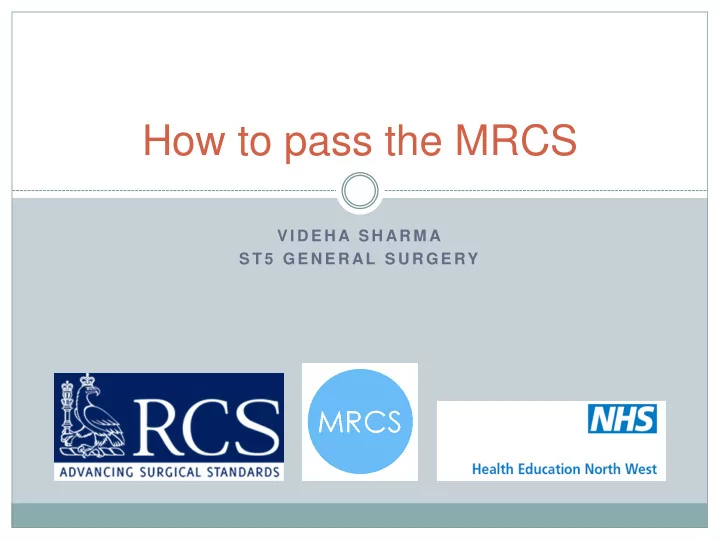

How to pass the MRCS V I D E H A S H AR M A S T 5 G E N E R AL S U R G E RY
Welcome! Excellent deanery providing range of knowledge and skills based teaching on a regular basis Fantastic tutors and educationalists who are keen to share their experience Passing the MRCS is an essential prerequisite for any aspiring surgeon Post graduate exams are tough! No one size fits all approach – identify your strengths and weaknesses and use them to your advantage
General information (Part A) 5-hour MCQ/EMQ exam 3 hours ‘Basic Applied Science’ 2 hours ‘Principles of Surgery in General’ No negative marking Pass mark around 70% https://www.intercollegiatemrcsexams.org.uk/mrcs/m rcs-exam-overview/ Mainstay of revision is practicing questions
Advice Timing: >3 months prep ➢ Plan during less busy job/around other life events ➢ Tell your AES/CS/rota coordinator you are sitting the exam – they will accommodate Make a revision plan ➢ Recurring themes in questions – make a list of weak areas ➢ Commit knowledge to short term memory close to exam date ➢ Be effective with your time: in between cases, nightshifts, driving to work
Resources CT teaching programme Small focus group sessions Books – most available in local library Acland’s Video Atlas of Anatomy ‘School of Surgery’ podcasts Online question banks ➢ eMRCS ➢ Passtest ➢ OnExamination
General information (Part B) 18-station OSCE ➢ 10 stations: Applied Skills ➢ 8 stations: Applied Knowledge Each station 9 min, marks out of 20 Combination of reading and hands on revision Essential to practice with a partner/in a group Identify MRCS examiners in your hospital and ask them to viva you Read guidance very carefully (timings, dress code, scenarios etc)
General information (Part B) Approach each station as if it is the first Develop your own pattern/style that works Communication skills are assessed in every station ‘humble confidence’ Break answers down into categories Think, structure and respond giving examiner insight into clarity of thought, prioritisation, organisation of ideas and decision making
Advice Anatomy usually a challenging part ➢ Prosections ➢ Bones/skeletons Pathology also challenging ➢ Visit path lab to look at specimens Attend clinics and practice examinations Practice answering questions (record yourself!) Do a ‘mock exam’ Go to exam location the night before – try to relax and approach the exam positively
Resources Books list: http://www.themastersurgeon.com/questions/OSCE/ MRCS_OSCE_stations.aspx Online resources: ➢ www.passthemrcs.co.uk ➢ Anatomy dissector http://ect.downstate.edu/courseware/haonline/quiz/pr actice/u7/quiztop7.htm ➢ Anatomy zone http://anatomyzone.com
Resources Courses: ➢ Locally organised days ➢ More intensive multiple days: http://www.surgicalcourses.com/ ➢ Dr Exam/St Thomas’/RSM Past papers are key as many questions are repeated!
Conclusions Tough exams! Plenty of support, resources and help available Make a plan and stick to it Commit your time – it will be worth it
Recommend
More recommend